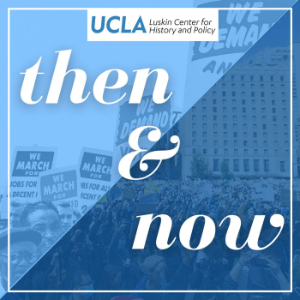
Then & Now
History Podcasts
Then & Now connects past to present, using historical analysis and context to help guide us through modern issues and policy decisions. Then & Now is brought to you by the UCLA Luskin Center for History and Policy. This podcast is produced by David Myers and Roselyn Campbell, and features original music by Daniel Raijman.
Location:
United States
Genres:
History Podcasts
Description:
Then & Now connects past to present, using historical analysis and context to help guide us through modern issues and policy decisions. Then & Now is brought to you by the UCLA Luskin Center for History and Policy. This podcast is produced by David Myers and Roselyn Campbell, and features original music by Daniel Raijman.
Twitter:
@luskinhistory
Language:
English
Special Episode: The Future of History Part 1
Duration:01:13:37
Special Episode: Plenary Address from the Urban History Association
Duration:01:12:53
Important Update for Then & Now
Duration:00:01:22
Race, Industry, and Resistance: A Conversation with Jennifer Klein.
Duration:00:32:40
The Challenge to University Autonomy in an Illiberal Age: A Conversation with David N. Myers and Ben Zdencanovic.
Duration:00:26:47
The Rise of the Religious Right in U.S. Politics: A Conversation with Neil J. Young.
Duration:00:25:43
Defunding Big Bird: The Politics and History of Public Broadcasting. A Conversation with Josh Shepperd.
Duration:00:28:21
A Conversation with Pulitzer Prize Winner Benjamin Nathans: The Lives and Afterlives of the Soviet Dissident Movement.
Duration:01:03:29
The Sociolinguistics of Exclusion: Affirmative Action, DEI, and the Struggle for Belonging. A Conversation with Jamaal Muwwakkil.
Duration:00:49:24
Coming Out Republican: The Gay Right and the Politics of Belonging. A Conversation with Neil J. Young.
Duration:00:38:00
Mexico's Dirty War and the Struggle for Accountability: A Conversation with Carlos Pérez Ricart.
Duration:00:47:29
Why History Matters: L.A. Wildfires Past, Present, and Future
Duration:01:07:50
Are There Limits to Presidential Power? A Conversation about the Unitary Executive Theory with John Mikhail.
Duration:00:44:40
Donald Trump’s Uses (and Abuses) of History: A Conversation with Bruce Schulman.
Duration:00:31:23
Preservation amidst Devastation: Salvaging Historic Tiles after the Los Angeles Wildfires. A Conversation with Conservator Amy Green.
Duration:00:35:28
Why History Matters in an Age of Polycrisis
Duration:01:03:43
Indigenous Fire Stewardship and Ecological Resilience: A Conversation with Daisy Ocampo Diaz.
Duration:00:42:38
Reconstructing German-Jewish Cultural Heritage after the Los Angeles Wildfires: A Conversation with E. Randol Schoenberg.
Duration:00:42:06
Trump 2.0 and the Implications for U.S. Foreign Policy: A Conversation with Stephen Wertheim.
Duration:00:36:12
Europe Without Borders: The Rise and Partial Fall of the Schengen Zone. A Conversation with Isaac Stanley-Becker.
Duration:00:40:44